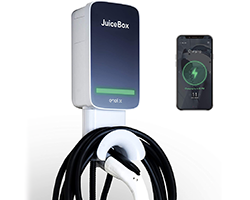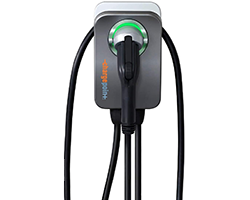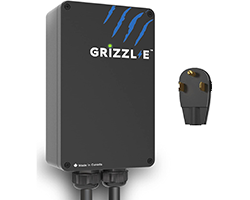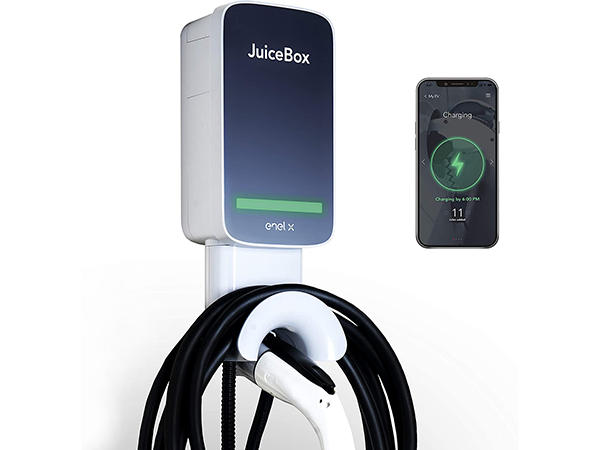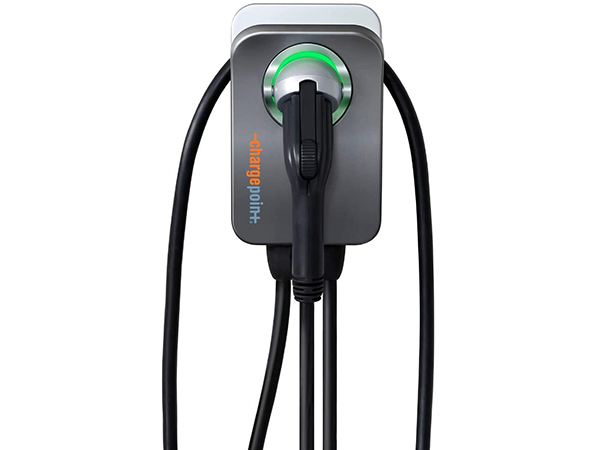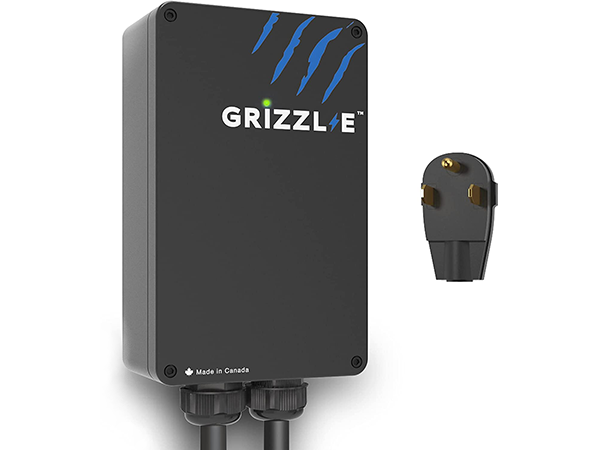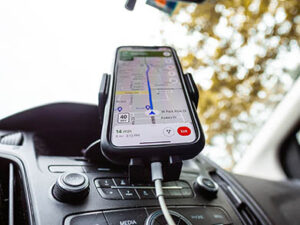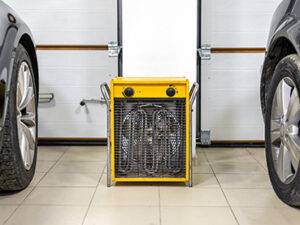Home \ Shop \ Automotive Garage \ EV Chargers For Home Garage
Best Electric Vehicle Chargers For Home (TOP Products Review and Buyer’s Guide)
Easy and quick vehicle's charging at home is the must? So, we have a TOP-rated Level 2 chargers that worth customers attention
- 1. JuiceBox 32 Charging Station
- 2. ChargePoint Home Flex EV Charger
- 3. Grizzl-E Level 2 EV Charger
- 4. Different EV Charger Types
- 5. How Does a Level 2 EV Charger Work?
- 6. What to Consider When Choosing a Level 2 EV Charger?
- 7. Last Words
- 8. Do I really need an L2 home charger?
- 9. What charger do I need to use with Nissan Leaf?
- 10. Do I need to buy a permit to install a home EV charger?
Being an electric car owner, do you frequently worry about the remaining battery capacity and corresponding charging times? If so, you are probably looking at home-based EV chargers and wonder if they would make your life easier. This would allow you to fill up your car with electricity in the comfort of your home, which is undoubtedly tempting. And with so many models already being available on the market, getting one that suits your needs should be easy. Dig a bit deeper, however, and you will find out there is a lot to consider when choosing between them. To help you pick the right one, we will go through a selection of the most popular devices on the market. Additionally, we will explore how EV chargers work and what different types are there.
PROS
- Functional design with LED lights display charging status
- The longest cable in the comparison
- Voice control and handy application
CONS
- Mounting hardware seems flimsy
FEATURES
- Level 2 charger with 32 Amps output
- Comes with a smartphone app for scheduling and monitoring
- Compatible with all popular electric vehicles on the market
- Voice control that works with Alexa and Google Home
- Comes with a standard NEMA plug or as a hardwired version
- Suitable for both outdoor and indoor use
Finding out who manufacturers JuiceBox is not a straightforward job, as they apparently have no dedicated web page. Still, a quick search will reveal that this name is a brand that belongs to Enel X, which is the largest provider of Demand response solutions. The idea is to make the power supply more efficient by adjusting the demand for electrical energy. This Boston-based corporation offers products and services that enable users to create and manage energy more efficiently and sustainably. And this is something where intelligent home EV chargers fit perfectly.
This Level 2 Smart EV Charging Station is one of their most popular products for domestic use. It offers a wide range of benefits, including simple installation and compatibility with all popular electric vehicles on the market. On the outside, its water-proof housing has LED lights that show the charging status. Lastly, this charger comes with a handy smartphone app and supports voice control using Alexa or Google Home.
PROS
- Sleek and elegant design
- Easy to install and use
- Allows users to choose between different power outputs
- Ensure noticeable savings on electricity costs
CONS
- Setting up the device is only possible using a smartphone
- The price
FEATURES
- Level 2 Charger with output ranging from 16 to 50 Amp
- Compactible with any electric vehicle on the market, including Tesla
- Operated and controlled by a smartphone application
- Comes with a standard NEMA plug or as a hardwired version
- Has a limited 3-year warranty
- Suitable for both outdoor and indoor use
Formerly known under the Coulomb Technologies name, ChargePoint’s primary goal is to design and manufacture hardware and software solutions for electric vehicles. Founded in 2007, this California-based company now operates the largest network of EV charging stations, with locations in more than a dozen countries. In their own words, they are trying to make the transition from classic vehicles to electric ones easier. Their product lineup has anything from efficient chargers for domestic use to powerful units for heavy-duty commercial applications.
Their Home Flex Electric Vehicle Charger has several significant features that set it apart. For a start, this level 2 device offers flexible power outputs, allowing users to find the right match. Additionally, it uses a highly-efficient technology that lowers the need for electricity while charging. And that all comes in a sleek and elegant housing that makes it suitable for any application.
PROS
- A strong aluminum casing makes it robust and less prone to mechanical damage
- Suitable for outdoor use in extremely cold climates
- The only EV charger that has Open Charge Point Protocol (OCPP) as standard
- Easy to install and use
CONS
- A buzzing sound it makes while charging may be annoying
FEATURES
- Level 2 charger with adjustable charge-rate ranging from 16 to 40 Amp
- Heavy-duty housing that is resistant to water and fire
- Protection against overheating and current fluctuations
- Available in four different finishes
- Suitable for both outdoor and indoor use
Like many other brands on the market, Grizzl-E is a commercial subsidiary of a larger company called United Chargers. This Canadian manufacturer actually started out in 2001 as a software developer, only to start designing and manufacturing equipment for electric vehicles in 2019. The reason for this shift is their CEO Gleb Nikiforov and his focus on eliminating ICE vehicles from cities.
This Grizzl-E Level 2 charger is one of the most popular products from this range, and there are several reasons for that. Among the upsides, an affordable price is probably the most important one. Additionally, the performance it offers is comparable to more expensive devices. Lastly, this is one of the most rugged chargers on the market, making it suitable for even the most demanding applications.
Different EV Charger Types
With the number of sold units rapidly increasing every year, the future undoubtedly belongs to electric vehicles. And the automotive industry itself is not the only one going through all these changes. What many already know, battery-powered cars are altering how we use them daily. One such thing is charging time, which may be a limiting factor in many applications, especially in comparison with gasoline-powered vehicles. To cope with this issue, manufacturers have come up with several different solutions. The result is a range of efficient devices that offer shorter charging times.
Regardless of their differences, all EV chargers on the market today fall in one of three main categories. For a start, we have Level 1 chargers, which are the most basic entry-level devices that still do their job. Similar to a mobile phone or any other battery power device, most EV cars come with it as a standard. Convenient and easy to use as they may be, these devices have certain limitations that may affect their application. The most important is the charging time, as most will only add several miles of range per hour. With that in mind, such charges are only sufficient for drivers that use their cars less extensively.
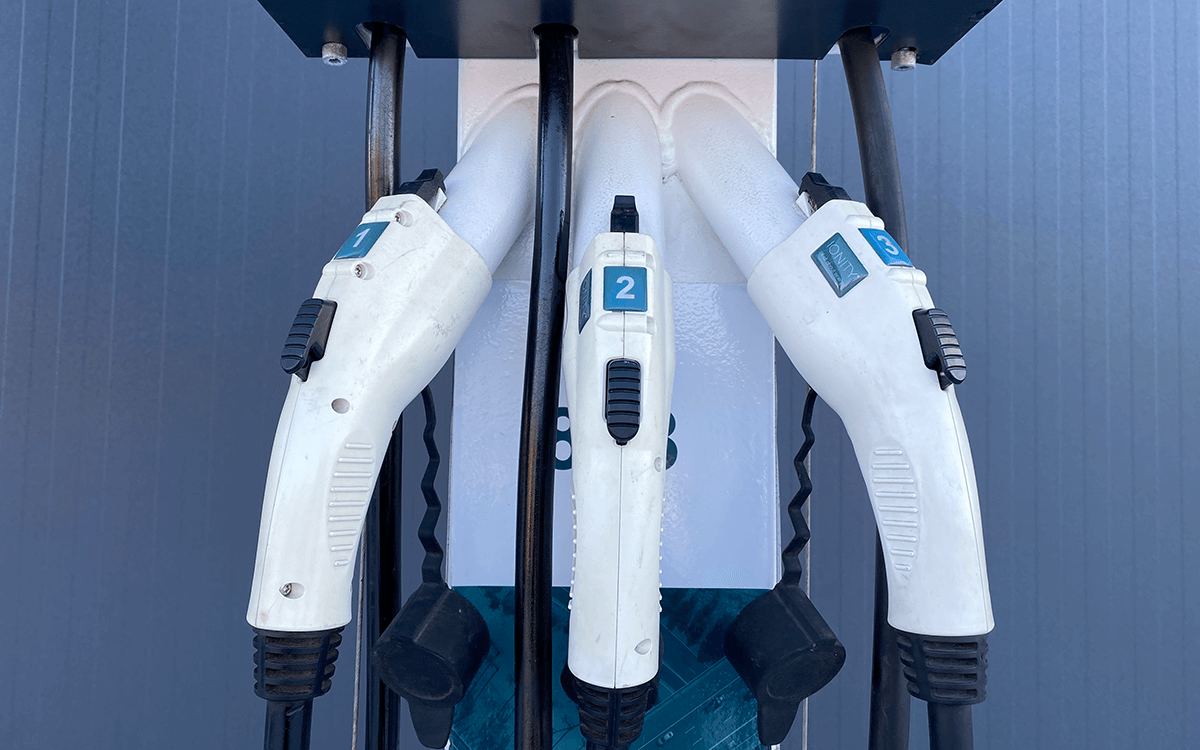
Level 2 chargers are the industry’s answer that offers shorter charge times and better flexibility for electric car owners. This is thanks to their higher power output, which allows them to charge up the car at a much faster rate. Level 2 chargers usually add 30 to 40 miles of range per hour, meaning a full charge is available in just a few hours. And a relatively simple technology that is behind them makes these devices affordable and easy to install. This is why Level 2 chargers are such popular options for home charging.
Lastly, we have Level 3 devices, which most refer to as superchargers or fast charges. As their name would imply, these will offer the shortest charging times, which often is less than half an hour. However, their complexity and high price make them unsuitable for domestic use. This is why they are usually only available at commercial charging points. Additionally, using them every day may not be the best idea, as their charging rate stresses out the battery.
How Does a Level 2 EV Charger Work?
As we already mentioned, Level 2 chargers offer an affordable and flexible way of charging up an electric car at home. But despite their superior performance, the technology behind these charges is relatively simple. The main difference between them and their Level 1 counterparts is the input voltage. While a Level 1 charger plugs into a standard 120V outlet, Level 2 devices run off a more powerful 240V one. This voltage difference increases its power output, which helps shorten the charging time. Although a standard household outlet only delivers 120V, many modern houses have several 240V ones for heavy-duty applications. And even if that is not the case, any electrician can easily install one. This is because all households actually have a 240V electrical installation, with standard outlets being wired in such a way to only provide half of that voltage.
What to Consider When Choosing a Level 2 EV Charger?
Among all characteristics, the maximum power output in kilowatts is the most important. But unlike what most would assume when it comes to it, more is not necessarily better here. This is because the internal circuitry in electric cars limits the power they can accept at a certain level. To avoid getting an oversized charger, you should find out the acceptance rate for your vehicle.
There are differences in connector types between various makes and models, which adds to the confusion. Most Asian vehicles will come with a Type 1 connector, while US and European manufacturers prefer Type 2 variants. Still, this is more of a general rule of thumb, and there are certain exceptions.
The location within the household in which the charger will be installed is another thing to consider. As obvious as it sounds, the garage will be the best choice for something like that. However, not all car owners have this luxury, which leaves them with a driveway as the only option. And if you are going down that route, make sure to get a charger suitable for outdoor use.
The last decisive factor is how the charger hooks up to the electric grid. Most come with a standard NEMA plug, making them compatible with high-voltage household outlets. This is a far better option, as it ensures a simple plug&play installation. Some models, however, will tap directly into an electric junction box, although these require professional fitment.
Last Words
As we have explained in this article, installing a Level 2 EV charger in your garage or driveway is an excellent idea. These devices give access to faster charging times, which will allow you to better utilize your electric car. And with a wide selection of products on the market, it is easy to find one that meets both your needs and budget.
FAQs:
Do I really need an L2 home charger?
To answer this question, you have to consider your driving habits and available time for charging. If your daily commutes include frequent short trips and you spend a lot of time at home, a Level 2 charger may do just fine. Being hooked up to it for the whole night will ensure enough juice for the next day, regardless of how slow charging it may be. Still, this may not be practical for most car owners because of their fast-paced lifestyles. This is where a Level 2 charger comes into its own, as it offers shorter charging times and far better flexibility. With that in mind, getting such a charger would be a great idea if you use your electric vehicle a lot.
What charger do I need to use with Nissan Leaf?
Nissan Leaf is one of many vehicles that can use all three types of chargers. Level 1 charging requires no additional equipment, although its rate may be too slow for some drivers. While fast-charging can be a solution in such situations, a domestic Level 2 charger may be a better option. There are many devices on the market to choose from, although you should avoid getting something too powerful. Because the Leaf can only accept 6.6kW, a charger with a 7.7 kW power rating will be perfect for the job.
Do I need to buy a permit to install a home EV charger?
The voltage at which a Level 2 charger operates is higher than standard household appliances. This always raises the question of permits and if the owner needs one when installing such a device. Although the answer may differ depending on the local regulation, this usually comes down to two separate scenarios. You will not need a permit for an indoor charger that plugs into the wall outlet, assuming there is a 240V outlet in your home. The situation is different with outdoor devices that hardwire into the electrical installation inside your house. This should be done by a professional and may also require a permit of a sort.
We do an efforts to find, research and recommend the best products. So, we may receive commissions from purchases that you make after following the links in our product reviews.
Related Products
-

Best Air Compressors For Home Garage Use in 2025 (Review)
-

Best Car Phone Mounts and Holders for Convenient Use in 2025
-

3 Best Shock Absorbers for Smooth and Precise Driving in 2025
-

The Best Garage Heaters in 2025 (For Garages That Fit 1-4 Cars)
-

Best Windshield Wipers and Wiper Blades Shortlisted in 2025


